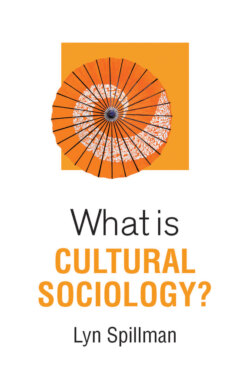What is Cultural Sociology?

Реклама. ООО «ЛитРес», ИНН: 7719571260.
Оглавление
Lyn Spillman. What is Cultural Sociology?
Contents
Guide
Pages
Series title. What is Sociology? Series
What is Cultural Sociology?
Copyright page
Acknowledgments
1 Introduction
Rituals, symbols, values, norms, and categories
The idea of culture
Culture in sociology
Cultural sociology and processes of meaning-making
Three lenses on meaning-making processes
Conclusion
2 Making Meaning Central
Convention, structure, and materiality in symbolic forms
Cognitive categories and symbolic boundaries
Schemas, frames, valuation, commensuration
Discursive fields, binary codes, narratives, and genres
Materiality and iconicity
Conclusion
3 Meaning and Interaction
Intention and reference in processes of meaning-making
Habitus and practice
Cultural repertoires and strategies of action
Idiocultures and subcultures
Group styles and scenes
Performance
Conclusion
4 Producing Meaning
The socio-historical context of meaning-making: beyond reflection theory
Cultural reproduction, change, and the problem of “articulation”
The production of culture
Cultural fields
Conclusion
5 Conclusion: Landscapes, Stages, and Fields
Foundations and presuppositions of cultural sociology
Landscapes, stages, and fields
Exploring the cultural sociology of What is Cultural Sociology?
What is missing from What is Cultural Sociology?
Debates and difference among cultural sociologists
Using the conceptual tools of cultural sociology
References
Index
POLITY END USER LICENSE AGREEMENT
Отрывок из книги
LYN SPILLMAN
I also thank Jonathan Skerrett, who motivated the project, Karina Jákupsdóttir, for her patience in seeing it through, and Justin Dyer, for his impressive copy-editing. The manuscript benefited from the comments of three anonymous reviewers. Michael Strand also offered helpful comments. Colleagues and students in Sociology at the University of Notre Dame create a stimulating environment for doing cultural sociology, and certainly enriched the picture presented here in many ways. Rebecca Overmyer provided enormous help by preserving time for this work among other responsibilities. Rachel Keynton, Robert Mowry, and Lilly Watermoon contributed essential background research at different stages of the project. I benefited from extended critical conversation on many of the topics included here with participants in my cultural sociology seminars. Especially fond thanks go to the seventy students who have worked with me over the years in preparation for advanced field examinations: I always finish our meetings feeling privileged by the opportunity. Russell Faeges helps in all these ways and many more and I thank him, too, for his sustained support.
.....
For Berger and Luckmann, structured patterns of social relations in groups are internalized by individuals in everyday life, and individuals then reproduce and sometimes change those patterns. For instance, an individual might internalize hierarchical family relations and then go on to live them out anew. Internalization is mediated by “signs” generated by surrounding social relations. So a child might understand family hierarchy through practical signs of interactional deference or explicit symbols of authority. This perspective on “the social construction of reality” synthesized disparate strands of social theory, from the macro to the micro – theories of objective social structure, theories of interaction, and phenomenological theories of subjective experience. Essentially, Berger and Luckmann offered a distinctively sociological vocabulary for understanding processes of meaning-making – in other words, for understanding “culture.”
So although sociologists were often vague about the concept of culture through the mid-twentieth century, they came to view what were essentially cultural processes through the lens of concepts like “ideology,” “collective conscience,” “interpretation,” and “the social construction of reality.” For some sociologists, the widespread acceptance of these ideas resolved uncertainties about analyzing culture. For many others, though, ideas like “the social construction of reality” were useful as signposts but opened more issues than they resolved. How does the dialectical social construction of reality operate in practice? What does this idea suggest about how to do sociological research on culture?
.....